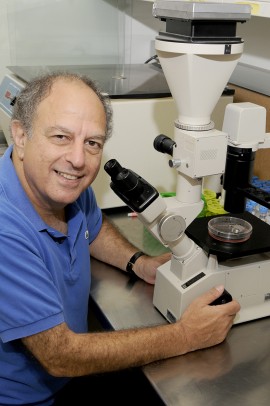Mouse study suggests drugs targeting cancer pathway could promote liver cancer
Certain cancer drugs now in clinical trials may actually increase the risk for liver cancer, according to a new study by University of Illinois at Chicago researchers published in the journal Cancer Cell.
The drugs target a family of molecules called Akt proteins that are known to drive the uncontrolled growth, division, and immortality of cancer cells. Akt proteins exist in three known variations, called isoforms – Akt1, Akt2 and Akt3 – and are activated in almost every cancer.
A handful of new drugs that target the Akt proteins are already in clinical trials, but researchers don’t know what to expect about their potential for side effects – especially if two or all three Akt proteins are suppressed simultaneously.

Nissim Hay, professor, biochemistry and molecular genetics;
Photo: Kathryn Marchetti (click on image for larger file size)
“We wanted to know what are the whole-body physiological consequences of targeting one Akt isoform and then two Akt isoforms together, because drugs currently in trials target all three of the Akt proteins,” said lead author Nissim Hay, professor of biochemistry and molecular genetics in the UIC College of Medicine.
When Hay and his colleagues systemically deleted Akt1 in mice that had tumors, the tumors shrank and the mice survived. When the researchers deleted Akt2, the mice developed hyperinsulinemia, or high levels of insulin in the blood.
Mice could tolerate deletion of both Akt1 and Akt3, but deletion of Akt1 and Akt2 together was quickly lethal.
When the researchers deleted Akt1 and Akt2 in just the livers of mice, they were surprised to find that the mice developed liver cancer. The mouse liver cancer cells had patterns of gene expression similar to those seen in aggressive human liver cancers.
“This was completely counterintuitive, but we figured it out,” Hay said. The deletion of Akt1 and Akt2 in the liver caused some liver cells to die. The dead cells caused local inflammation from immune cells called macrophages, which secrete cytokines. And cytokines are known to promote liver cancer.
“The cytokines being released in the liver caused some of the surviving liver cells to grow and divide very aggressively,” Hay said.
The researchers also found that the deletion of Akt2 alone led to elevated insulin levels in the blood. “This may have encouraged the development of tumors, possibly because high levels of insulin in the blood further activate the other Akt isoforms and oncogenic pathways,” he said.
Hay said drugs that inhibit all three Akt isoforms could be dangerous for those cancer patients who have conditions that cause the liver to become inflamed — such as hepatitis, cirrhosis or obesity. In these patients, an Akt-inhibiting drug could trigger a cycle of inflammation that ultimately leads to the development of liver cancer. But results of this study, he said, suggest that inhibitors that specifically target individual Akt isoforms could avoid these adverse consequences.
Hay cautioned that the effects of Akt-inhibiting drugs are not exactly the same as systemically deleting the Akt proteins in mice.
Qi Wang, Wan-Ni Yu, Xinyu Chen, Xiao-Ding Peng, Sang-Min Jeon of UIC; Grace Guzman of the University of Illinois Hospital & Health Sciences System, and Morris Birnbaum of the University of Pennsylvania are co-authors on the paper.
This research was funded by National Institutes of Health grants R01 1AG016927, R01 CA090764 and R01 DK56886 and VA Merit Award BX0007733.
